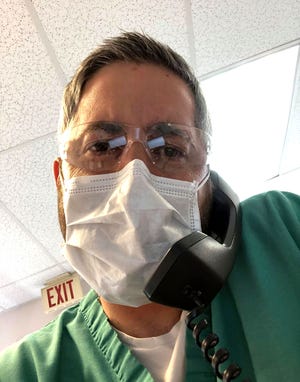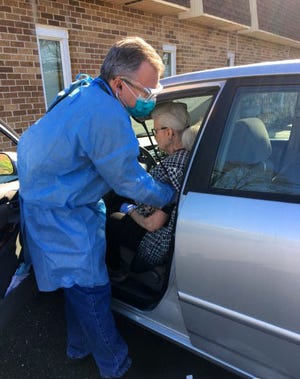
Dr. Sadel in the News – Primary care doctors wait for COVID vaccines as patients seek answers
Call your primary care doctor first.
That’s the direction patients are typically given when they’re facing a non-emergency medical situation.
But in the case of securing the COVID-19 vaccine, many primary care physicians and their patients have been left in the dark.
Thousands of calls have flooded private doctors’ offices across Pennsylvania since the rollout of the COVID-19 vaccine.
Yet primary care physicians who aren’t affiliated with hospitals are among the last in line to receive and distribute the vaccine to patients, medical leaders say.
Dr. Keith Sadel, who owns and operates a private family practice in Upper Southampton, filed his paperwork to get the vaccine for his patients and submitted the required forms two months ago.
Still, no vaccine.
“When I see that some of my patients who are young and healthy and are not health care workers getting the vaccine at Rite Aids, while my patients 65 years and older can’t get the vaccine and they look towards me, this is frustrating as you can imagine,” said Sadel, who cares for about 4,000 patients, most of whom are elderly and have medical conditions. “I do not understand why pharmacies are placed over physicians to deliver the vaccine.”
He is not alone.
The federal government has largely left vaccine rollout to the states and public health departments, and Pennsylvania, like many states, is relying on hospitals to be the main distribution points.
More:‘We need to do a better job’: COVID-19 vaccine rollout limited by slow supply of doses, Wolf says
Pennsylvania last week opened up vaccine eligibility to anyone 65 and older and adults with pre-existing medical conditions, spiking demand despite dwindling supply.
On Tuesday, Gov. Tom Wolf expressed frustration with the federal government’s coronavirus vaccine rollout, saying Pennsylvania needs 6.5 million more individual doses just to complete full vaccination of everyone in the current 1A phase of the state’s plan.
Yet there are questions about whether the state and its counties are making use of all the vaccines delivered so far.
An online report from Becker’s Hospital Review ranked Pennsylvania 42nd out of the 50 states in percentage of vaccine doses received that have been administered. Of the approximately 1.6 million vaccines delivered to the state, about 800,000 have not yet been given, according to data from the state and Centers for Disease Control and Prevention.

“If they gave us a thousand vaccines tonight, I’d have it in a thousand arms this week,” said Hatboro family doctor Harris Cohen, who has the refrigeration and staff in place to give the Moderna vaccine, one of two that has received emergency use approval from the Food and Drug Administration.
Only a fraction of the vaccines distributed so far have gone to primary care physicians, according to the state’s list of approved providers. At the same time, confusion about how to sign up for a shot has left many Pennsylvanians frustrated, and those at high risk of serious complications from COVID-19 continue to wait, with little news on when they’ll be inoculated
More:Bucks, Montgomery County hospitals work to give COVID vaccine amid ‘temporary choke point’ in supply
That confusion has translated into about a hundred calls a day flooding Cohen’s family practice, Hatboro Medical Associates.
“This is the most important health issue we have right now, yet there are so many roadblocks,” he said. “Every patient I see asks about it and I don’t have an answer. It reminds me of the testing shortage in early March. Again, I feel paralyzed that I don’t have the answer.”
Pennsylvania Department of Health officials don’t have the answers either. When asked, they lacked a detailed explanation for how the distribution of vaccines is being prioritized for nonhospital providers.
April Hutcheson, the Pennsylvania Department of Heath’s director of communications, said, “In terms of who becomes a provider to administer vaccine – first, it has to be within the scope of practice of the doctor to be able to provide injections. Then they enroll as a provider.”
Hutcheson then provided the state’s link for providers, outlining the application process and requirements.
Both Sadel and Cohen have met those requirements. Yet when they see who is receiving the vaccine in their region – such as a Bucks County dermatology office – more questions surface.
While Cohen acknowledges that the vaccine rollout is one of the greatest logistical challenges ever undertaken, Cohen said primary care doctors are in a position to get the vaccine to their patients quickly and safely.
“We have the mechanism in place and the ability to do it, but they need to get the vaccine in the right people’s hands,” he said.
He said his practice could offer a drive-thru vaccination service that would prioritize his sickest and oldest patients, many of whom don’t have access to the present online registration method set up by the county.
“We know their chronic diseases and could start from the oldest and most ill,” he said.
To determine which providers get the vaccine, Maggi Barton, a deputy press secretary at the Department of Health, said the agency uses a formula looking at population; population 65 and older; percent positivity; and death rate; as well as other factors, such as inventory on hand, to determine how to allocate the limited doses of vaccine among counties and providers. From there, the federal government provides information to providers about how much vaccine they will receive.
More:Bucks County opens vaccine hotline to reach those without internet, as online registration continues
A call for more vaccines
On the national front, medical leaders are calling on President Joe Biden to direct states to get vaccines to physician practices. In a Jan. 26 letter, Halee Fischer-Wright, CEO of Medical Group Management, cited a survey that showed 85% of independent practices and 45% of hospital or health system-owned practices actively seeking the COVID-19 vaccine for their patients reported having obtained none to date.
“Despite possessing the ability to identify and inoculate vulnerable patients, states have largely not leveraged physician practices in vaccine rollout efforts,” she wrote.
She said that many physician groups have been approved by their states to distribute the vaccine, but as the survey results indicate, they have so far received little to no inventory, she said.
“We strongly believe that medical groups have a critical role to play in COVID-19 vaccination efforts due to their trusted role as providers within the community and ability to identify vulnerable patients,” she said.
Leading Pennsylvania hospital officials agree that the vaccine needs to go beyond hospitals and into community doctor’s offices and clinics. Andy Carter, association president of the Hospital and Health System Association of Pennsylvania, told reporters last week that “this public health effort must expand to include more pharmacies, doctors’ offices, and community-based vaccine clinics.”
Not only are doctors having trouble getting vaccines for patients, many physicians and medical staff not employed by hospitals or health systems reported problems getting inoculated themselves, even though they are caring for patients who are in the top-priority group.

Many hospitals, given the bulk of the first vaccine shipments, also are choosing to vaccinate all staff, including those who aren’t involved in patient care or visitor contact, before passing vaccines onto unaffiliated family doctors. Bucks County recognized this and set up a vaccination site at Woods Services in Langhorne to make sure front-line health and EMS workers get the vaccine. But when the state expanded the eligibility, state medical leaders sounded the alarm.
“While the Pennsylvania Medical Society applauds DOH for expansion of 1a of its vaccination plan to include our most vulnerable citizens, we remain highly concerned that a number of health care workers not connected to large systems remain unvaccinated, unnecessarily putting our front-line workers and their families at risk while asking them to take care of our most critical patients,” the group said.
On Tuesday, more than a week after the expansion, Claire Shearer, the medical society’s communication director, said, “We are excited for the general public, but we have concerns that our front-line workers are still not all vaccinated.”
‘Begging for the vaccine’
Cohen said he was able to get his vaccine through Doylestown Hospital, which under a state order is required to set aside 10% of vaccines for community front-line workers.
But for doctors working to secure the vaccine for patients, it’s been “a mad scramble.”
Sadel, who applied as early as he could, has been calling the state health department to check on the status of his application. One woman, he said, inquired about his freezers and wanted the make and model numbers.
Two weeks later, he learned his application is “under consideration.”
“What upsets me is that I get information from pharmacies that are vaccinating people in their 30s and 40s, not employed in the medical industry,” he said.
In the meantime, he said: “I have patients so scared that they can’t get the vaccine; one lady is sick and in her 80s, with no computer, and doesn’t know what to do, yet we have some people who are healthy able to get the vaccine at (a pharmacy). It doesn’t make sense.”
Many of his patients, he said, fear going to a pharmacy for the vaccine, he said.
“I know my patients, and I’m much more equipped to give vaccine than a pharmacy,” said Sadel, adding that he has a defibrillator, IV fluid and other medications on hand in case someone has a reaction. “I’m capable of handling emergencies in ways pharmacies are not.”
For his wife, Vivi, who helps run the practice, it’s hard to explain why primary care physicians have been left out.
“The little guy can help but has no means, no capacity and/or is stuck in that all too familiar bureaucratic loop,” she said. “Meanwhile, we are the ones that get the 50 calls a day almost begging for the vaccine.”
